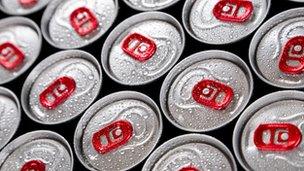Pupils breakfasting on energy drinks
- Published

Energy drinks can have very high levels of caffeine and are not usually recommended for children
One in 20 teenage pupils goes to school on a can of energy drink instead of a good breakfast, a survey suggests.
A third of UK teenagers eat unhealthy breakfasts such as fry-ups or crisps, the poll of 2,000 youngsters aged between 12 and 18 suggests.
Four out of 10 skip breakfast altogether to lose weight, the poll for the Make Mine Milk campaign suggests.
Brian Lightman, general secretary of the Association of School and College Leaders, said the results were a worry.
He said pupils breakfasting on energy drinks, which are not usually recommended for children, was something he had seen as a head teacher.
'Hyperactive'
"When children arrive in schools having started the day eating or drinking totally inappropriate things like that, they are in no fit state to be in the classroom.
"They can be hyperactive, and it can have a very negative effect on their behaviour."
He added that parents should be ensuring that their children were eating good breakfasts, rather than sending them off with money to buy something on the way to school.
He added: "There's a lot of advertising with these drinks and they are fashionable, and teenagers love things that are fashionable."
Dr Mary Bousted, general secretary of the Association of Teachers and Lecturers (ATL), also said it was vital that children had a good and nutritious breakfast to set them up for the day and enable them to concentrate in class.
"A healthy breakfast is also important in stopping children become fractious and badly behaved.
"It is worrying to think that some children are breakfasting on energy drinks, such as Red Bull, which are stuffed full of sugar and stimulants and have little nutritional value.
"School breakfast clubs can play a key role in making sure children have had a good breakfast before they start school to help their learning. And we would like children to be taught about healthy eating, so they learn about healthy diets and how to cook nutritious meals."
Caffeine content in such energy drinks ranges from about 8mg of caffeine - about the same as an espresso coffee - to as much as 400mg.
'Shot style'
Some of the smaller "shot style" products can contain as much as 175mg of caffeine in a 60ml bottle.
Drinks containing more than 150mg of caffeine per litre (mg/l) must be labelled with the term "high caffeine content", and the Food Standards Agency recommends that children should only "consume in moderation drinks with high levels of caffeine".
The makers of the Red Bull Energy Drink did not wish to comment on the issue raised but its website says: "Red Bull Energy Drink's special formula has been appreciated worldwide by top athletes, students, and when undertaking demanding work or during long drives."
It adds the drink is "the ideal equipment when you are active and keen to set personal bests".
Director general of the British Soft Drinks Association Gavin Partington said: "The soft drinks industry is clear that energy drinks are not suitable for children, and we want to get that message across to young people and their parents.
"Adults might choose an energy drink, containing about as much caffeine as a typical cup of coffee, when they want a physical or mental boost. But, like all food and drink, energy drinks should be consumed in moderation as part of a balanced diet and active lifestyle."
- Published16 October 2012
- Published20 June 2012